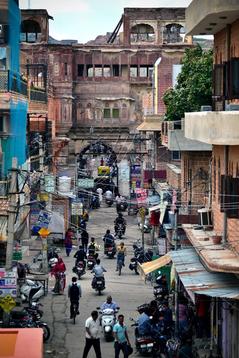As two-wheelers have one of the largest shares of mode mix in India and are part of e-commerce, deliveries, and last-mile connectivity, it is critical to discuss the needs and opportunities in this developing market. It is crucial ahead of COP26, as India can be an example of the transition that needs to be delivered in other South Asian, Southeast Asian and African markets with similar mobility characteristics.
As part of the RouteZero ambition platform, on May 17th, 2021, leading experts and decision-makers came together at a round table to discuss the barriers and opportunities to accelerate the electric two-wheelers (E2W) rollout. RouteZero is a platform convened by the Climate Group and the UN High-Level Climate Champions to accelerate the transition to zero emission vehicles (ZEVs) through non state actor commitments, communications and advocacy, in support of the UK government’s clean road transport campaign theme at COP26.
The virtual round table was organised by Climate Group, WBCSD and World Economic Forum jointly. It gathered the most promising leaders in the electric two-wheeler ecosystem in India as speakers and participants. This event was attended by 60+ participants from all segments of the industry, including national and state-level government organisations, policymakers, manufacturers, financial institutions, charging infrastructure providers, last mile and delivery logistics providers, micromobility services companies, utilities and research organisations and academia.
High-level panel discussion
The round table included a high-level panel discussion with leading speakers from Niti Aayog, the Government of Delhi, the Government of Karnataka, the Ministry of Road Transport and Highways (MoRTH), and Hero electric. World Economic Forum moderated this session.
The panel discussed India’s systemic challenges and highlighted key actions taken by the national government, state governments and corporates while emphasising the accelerated transition of electric two-wheelers. India is the world’s second-largest market for two-wheelers. However, while in the largest market, China, electric two-wheelers now account for over 60% of category sales, it is still less than 1% in India. There are policies in place to catalyse annual sales of one million electric two-wheelers by the end of 2022. But in 2020, fewer than 26,000 vehicles had received the subsidies offered for this purpose.
Key points discussed during the panel discussion
- The significance of fleets electrification was highlighted as it offers a unique opportunity to scale progress.
- To address the challenge of setting up the charging infrastructure, the central government is pushing its efforts to develop charging equipment and protocols that would be simpler, affordable and easy to install at residential premises.
- Delhi has high ambition targets on a rapid transition, including 100% delivery service fleets electrified by 2025 (50% by 2023). But today, there are fewer than 4,500 EVs on the streets of the capital state. There needs to be a simultaneous explosion in vehicle supply and purchasing demand, alongside significant grid and infrastructure upgrades to enable change.
- The Government of Delhi ensures technology-agnostic incentives are applicable for battery swapping as well as fixed charging modes. They have a streamlined mechanism where any business owner or even a private homeowner can set up charging infrastructure to accelerate the adoption.
- Karnataka has differential tariffs for creating charging stations, so there are incentives for more people to set up the charging stations. On the supply side, they are looking at incentivising manufacturing. The state government is also working with the last mile providers and fleet providers to ensure grid stability.
- A representative from Hero electric spoke about the importance of the length of regulatory frameworks. It was stated that second-hand market and resale value are some of the gaps that aren’t being considered right now, which can potentially boost the adoption. The importance of swap charging was also stressed to surpass the desired ambition for the adoption of electric two-wheelers in India.
Focused discussions
The panel discussion was followed by three breakout sessions with participants from various organisations, including TVS, Bajaj, RMI, Yulu, Yes Bank, Gogoro, Go Zero, TERI, Amazon, Flipkart, Ola, World Bank, IFC, BRPL, Magenta Power, ARAI and Bounce. The participants had to discuss and recommend priority actions for local and state governments on scaling up vehicle availability and local manufacturing, generating demand for electric two-wheelers and finance solutions, and developing requisite infrastructure.
You can find more about the RouteZero initiative here.
